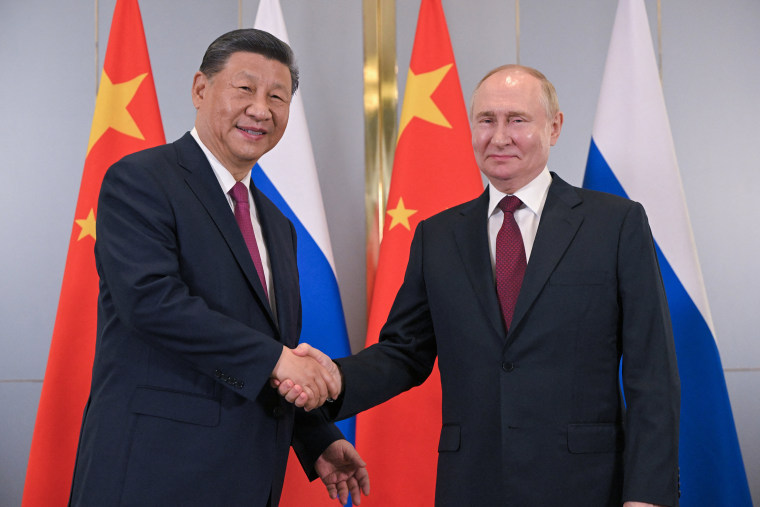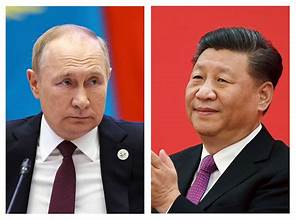Putin and Xi meet at Central Asian summit aimed at countering U.S.
The Shanghai Cooperation Organization, a security group led by Russia and China, is welcoming Belarus as its newest member during a meeting in Kazakhstan.

ASTANA, Kazakhstan — Russian President Vladimir Putin and Chinese President Xi Jinping hailed their Eurasian security club on Wednesday as a force for global stability at a summit of the regional body, which is seen by Moscow and Beijing as a tool to counter Western influence.
Putin and the Chinese president have expanded the Shanghai Cooperation Organization (SCO), a club founded in 2001 with Russia, China and Central Asian nations, to include India, Iran and Pakistan as a counterweight to the West.
“The organization has firmly established itself as one of the key pillars of a fair, multipolar world order,” Putin said, adding that bilateral ties between Moscow and Beijing were at their best in history.
“Our cooperation is not aimed against anyone, we are not creating any blocs or alliances, we are just acting in the interests of our peoples,” Putin said.
In his opening remarks, Xi told Putin that China and Russia should “uphold the original aspiration of friendship for generations” in response to an “ever-changing international situation.”
Calling Putin an “old friend,” Xi alluded to the progress the two countries had made in putting in place “plans and arrangements for the next development of bilateral relations.”
The Kremlin said Putin had held a series of bilateral meetings on the sidelines of the SCO summit, which is taking place in Astana, capital of Kazakhstan, and ends on Thursday.
The SCO promotes common approaches to external security threats such as drug trafficking and also focuses on countering any domestic instability.
Ahead of his meeting with Xi, Putin met Turkish President Tayyip Erdogan, Pakistani Prime Minister Shehbaz Sharif, and the presidents of Azerbaijan and Mongolia, Ilham Aliyev and Ukhnaagiin Khurelsukh.
India said Prime Minister Narendra Modi, who is expected in Moscow later this month, would not attend the Astana gathering, sending Foreign Minister Subrahmanyam Jaishankar instead.
China and Russia declared a “no limits” partnership in February 2022 when Putin visited Beijing, days before he sent tens of thousands of troops into Ukraine. Since then, Xi and Putin have deepened relations.
Xi and Putin believe the U.S.-dominated post-Cold War era is crumbling. The U.S. casts China as its biggest competitor and Russia as its biggest nation-state threat. President Joe Biden says this century will be defined by an existential contest between democracies and autocracies.
At last year’s virtual summit, the group criticized what it called the negative impact of “unilateral and unlimited expansion of global missile defense systems by certain countries or groups of countries,” without directly referring to NATO expansion or Western military assistance to Ukraine.
In a move that highlighted Beijing’s pragmatic economy-driven approach, Xi presided over a ceremony on Wednesday with his Kazakh counterpart just hours before meeting Putin, to mark the departure of a fresh batch of cargo along the Trans-Caspian International Transport Route.
The route, also known as the Middle Corridor, starts in Southeast Asia and China, running through Kazakhstan, the Caspian Sea, Azerbaijan, Georgia and further to Europe. It has been heavily promoted by the West as an alternative to Asia-Europe land transit via Russia.
Belarus will attend the Astana summit for the first time as a full member of the SCO, the Kremlin said. United Nations Secretary-General Antonio Guterres is also expected to attend the Astana gathering.
–
Source: NBC News



